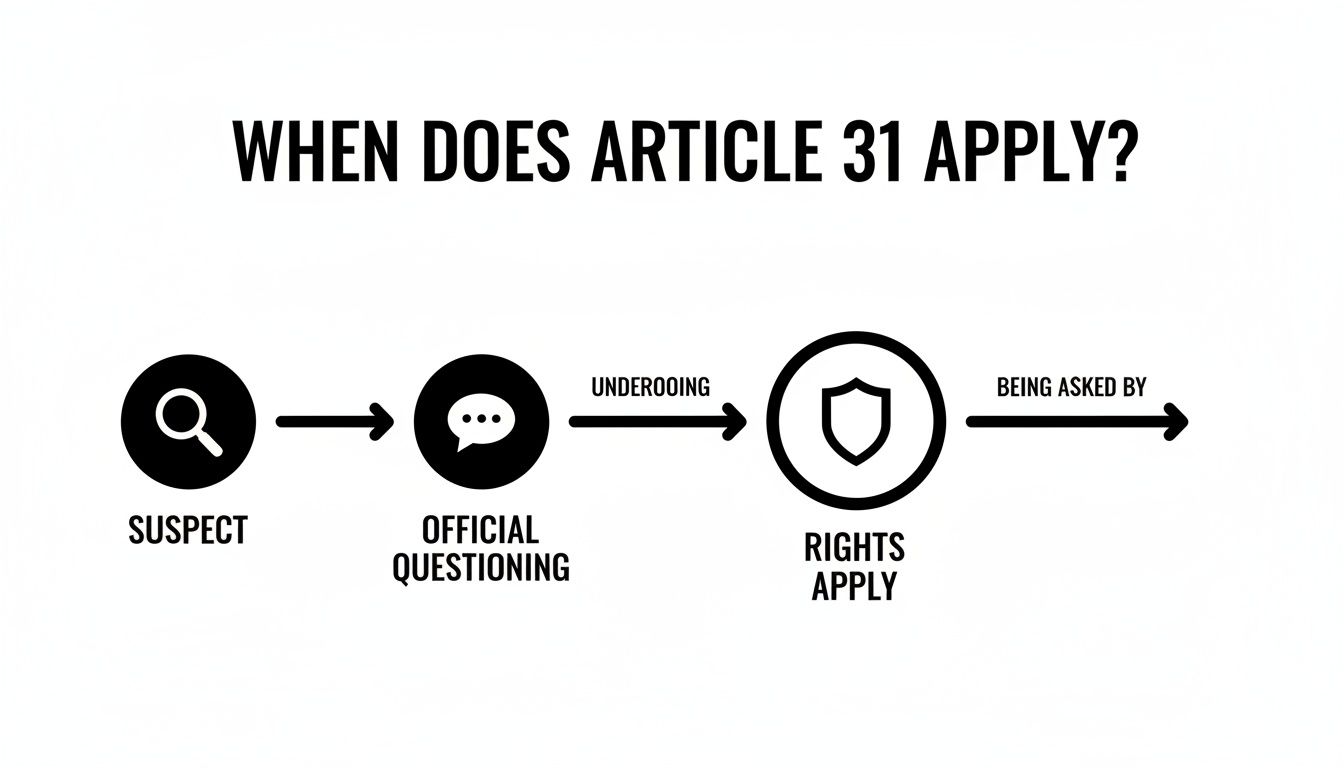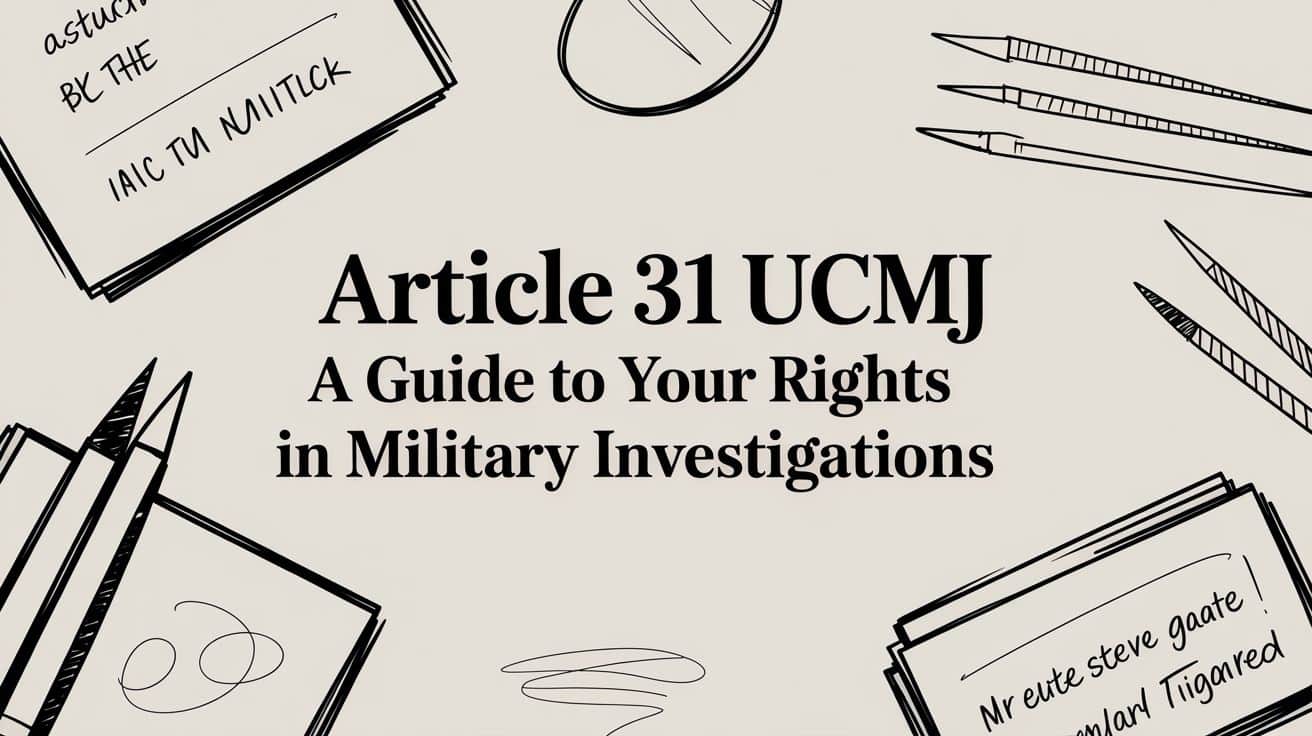When you’re a service member under investigation, it can feel like the walls are closing in. Seeing agents from CID, NCIS, OSI, or CGIS walk through the door is a stress-filled moment that can leave you feeling completely powerless.
But it's in this exact moment that you're armed with powerful, specific protections designed to shield your future. This is where Article 31 of the UCMJ becomes your most important line of defense.
Your Essential Rights Under Article 31 UCMJ

Think of Article 31 UCMJ as your personal legal armor during any official questioning. It’s not just a procedural checklist for investigators; it’s a set of fundamental rights that levels the playing field between you and them. Grasping what these rights mean for you is the first—and most critical—step in protecting yourself.
This protection isn't new. Enacted back in 1951, Article 31 of the Uniform Code of Military Justice (UCMJ) was a landmark shift, cementing a service member's constitutional protections into military law. Its core principles have stood firm for over seven decades.
The Three Pillars of Your Protection
At its heart, the Article 31(b) warning is built on three mandatory notifications that an investigator must give you before asking a single question about a suspected offense. These aren't suggestions; they are absolute legal requirements.
- The Nature of the Accusation: They have to tell you what specific offense you are suspected of committing. You can't be tricked into talking about a vague "incident." You have the right to know exactly what the investigation is about.
- The Right to Remain Silent: This is your absolute right to not answer any questions. You are not required to give a statement, explain your side of things, or try to "clear the air." Your silence cannot be used against you as evidence of guilt.
- Consequences of Speaking: Investigators must warn you that any statement you make—whether spoken or written—can be used as evidence against you in a court-martial. This hammers home the serious weight your words carry.
These three rights create a critical barrier, making sure you aren't coerced or misled into making statements that could destroy your career and your freedom.
To give you a quick reference, here are the core protections you are guaranteed.
Your Core Article 31 Protections at a Glance
| Your Right | What It Means for You |
|---|---|
| Notice of the Accusation | Investigators must clearly state the specific offense you're suspected of before questioning begins. |
| The Right to Remain Silent | You have the absolute right to refuse to answer questions, and your silence cannot be held against you. |
| Warning of Consequences | You must be warned that anything you say can and will be used against you in a trial by court-martial. |
These rights aren't just read from a script; they are foundational to the entire military justice process. They are your shield. Understanding what a rights advisement means in a military investigation is your best defense from the very first moment.
Of course, these protections are part of a larger legal framework. Understanding related concepts, like the essential attorney-client privilege rules, is also vital for anyone facing a legal battle.
Recognizing When Article 31 Rights Kick In
One of the most dangerous myths floating around the barracks is that Article 31, UCMJ, protects you in every conversation with a superior. It doesn't. Knowing the exact moment your rights are legally triggered is the key to protecting your career and your freedom.
There's a world of difference between your squad leader pulling you aside for being late and a formal sit-down with military investigators. For Article 31 warnings to be mandatory, the situation has to meet a specific, two-part legal test. It’s not about the tone of voice or where you're standing; it’s about the legal reality of the interaction. Getting this wrong can leave you exposed when you think you're protected.
The Two-Part Test for Article 31
The law is crystal clear on this. Your rights must be read only when two conditions are met at the same time. If one part is missing, it’s not an official interrogation, and they don't have to warn you.
- Questioning by a Military Authority: The person asking the questions has to be subject to the UCMJ (think commanders, NCOs, MPs, or agents from CID/NCIS/OSI/CGIS).
- You Must Be a Suspect: They have to suspect or accuse you of committing a specific crime under the UCMJ.
This means a routine counseling session for poor performance won't trigger Article 31. But if your First Sergeant calls you into his office and asks, "Were you involved in the theft from the supply cage last night?" everything changes. You are now a suspect being questioned by a military authority. Your rights are now in play.
Key Takeaway: It’s not about rank; it’s about suspicion and official capacity. The second a conversation shifts from a general inquiry into an effort to gather evidence against you for a crime, your Article 31 rights should activate.
From Casual Chat to Official Questioning
Investigators are masters at blurring the line between a casual conversation and a formal interrogation. It’s a common tactic. They start off friendly to get you comfortable, then slowly pivot to the real reason they want to talk.
Picture this: your NCO walks up and asks, "Hey, did you see anything weird happen near the arms room last night?" At this point, you're just a potential witness. But then the follow-up comes: "Where exactly were you around 2200 when that NVG went missing?" The focus just snapped directly onto you. You've gone from witness to suspect.
Here’s how to spot that critical shift:
- General vs. Specific Questions: The questions change from "what happened out there" to "what did you do."
- Witness vs. Suspect: You are no longer just another person they're talking to; you are now the focus of the investigation.
- Location Changes: You're asked to move the conversation to a private office, the MP station, or a sterile interview room.
- Note-Taking Begins: The person asking questions pulls out a notepad or starts typing and formally documenting your answers.
Recognizing this pivot is everything. It’s your cue to stop talking, take a breath, and realize that every word you say from this point on has serious legal weight. It's no longer just a conversation—it's now part of a criminal investigation under Article 31, UCMJ, and your protections are officially on the line.
Article 31 vs. Miranda: Why They Are Not the Same Thing
Most service members have heard the phrase "Article 31" and immediately equate it to the "military Miranda." It's an easy comparison to make, and while they both come from the same place—the Fifth Amendment's powerful protection against self-incrimination—thinking they're identical is a dangerous mistake.
The differences aren't just legal nitpicking; they are fundamental distinctions that can make or break your case during a military investigation. Let's break down exactly what sets them apart.
The Custody Requirement: A Critical Divide
The single biggest difference comes down to when these rights kick in. This isn't a small detail; it dramatically changes the scope of your protection.
Civilian Miranda rights are triggered by what's called custodial interrogation. This is a two-part test. For a cop to be required to read you your rights, you must be (1) in custody (meaning you're not free to leave) and (2) under interrogation. If you're just having a voluntary chat with police at your front door, Miranda likely doesn't apply.
Article 31 of the UCMJ completely scraps the custody requirement. It's much, much broader. Your Article 31 rights apply the moment two conditions are met: you are a suspect in an offense, and someone subject to the UCMJ starts questioning you about it.
It doesn’t matter where you are. It could be in a CID interrogation room, in the motor pool, in your barracks room, or downrange.
The Bottom Line: If a military authority figure—from an NCO up to an officer or investigator—suspects you of a crime and asks you questions about it, they must read you your Article 31 rights. This protection activates far earlier than its civilian counterpart.
This flowchart lays it out as simply as possible.

As soon as you become a suspect and the questioning begins, the law requires that you be advised of your rights. No exceptions.
Telling You What It's About: The Nature of the Accusation
Here’s another huge advantage for service members. Article 31(b) requires the questioner to tell you the specific nature of the accusation. They have to lay their cards on the table and tell you what crime they think you committed.
This is a critical protection. It stops investigators from going on a vague "fishing expedition," hoping you’ll get nervous and confess to something they didn’t even know about.
Miranda warnings have no such rule. A civilian cop can simply tell you that you have the right to remain silent without ever telling you why you're being questioned. You're left guessing, which puts you at a massive tactical disadvantage.
What About the Right to a Lawyer?
This is where things get a bit more layered. We all know the famous Miranda line: "You have the right to an attorney." But if you read the text of Article 31(b), you won't find that phrase.
So, where does a service member's right to a lawyer during questioning come from? It's not a loophole; the right is ironclad, but it's built from a combination of sources:
- Military case law has long held that the Supreme Court's landmark ruling in Miranda v. Arizona applies to the armed forces.
- The right is also spelled out in Military Rule of Evidence 305, which is the rulebook for military interrogations.
This means you absolutely have the right to a lawyer, but that right is a legal protection that works alongside Article 31, not directly from its text. It’s a great example of how different layers of military law come together to protect you. You can see how this plays out in real-world scenarios by understanding the differences between command interviews versus law enforcement interviews.
Comparing Article 31 and Civilian Miranda Rights
To make it crystal clear, this table breaks down the key differences between your military and civilian rights warnings.
| Feature | Article 31 (UCMJ) | Miranda Rights (Civilian) |
|---|---|---|
| When It Applies | When a service member is a suspect and is questioned by a military authority. | When a person is in custody and under interrogation. |
| Notice of Offense | Required. You must be told the specific nature of the accusation against you. | Not required. Investigators do not have to state the reason for questioning. |
| Right to Counsel | Provided through case law and military rules, not explicitly in Article 31(b) text. | Explicitly stated as part of the standard warning. |
| Scope of Protection | Broader trigger; applies in non-custodial settings and formal questioning. | Narrower trigger; limited to situations where a person's freedom is restrained. |
While it's easy to call Article 31 the "military's Miranda," it's more accurate to see it for what it is: a unique and, in some key ways, more powerful shield. Its protections are broader and activate much earlier in an investigation, giving an informed service member a significant advantage.
How to Properly Invoke Your Rights

Knowing your Article 31 UCMJ rights is one thing. Actually using them under the immense pressure of an interrogation room is something else entirely. Investigators are masters at creating an environment where talking feels like your only way out.
It’s not.
Exercising your rights is the single most important move you can make to protect your career and your freedom. The strategy is simple: be clear, be direct, and do not back down.
Be Clear and Unambiguous
This is no time for subtlety. Investigators are trained to exploit hesitation and ambiguity. Phrases like "I think I should get a lawyer" or "Maybe I shouldn't say anything" are not enough. To an investigator, that's just a negotiation. They will see it as an open door to keep pushing.
You have to be a brick wall. Use simple, direct language that leaves zero room for interpretation.
Memorize these two sentences. They are the only ones you need:
- To exercise your right to silence: "I am invoking my right to remain silent."
- To exercise your right to counsel: "I want to speak with a lawyer."
Once you've said these words, all questioning is legally required to stop. Period. Say nothing else. Don't try to explain yourself or make small talk. If they keep asking questions, just repeat the same phrase over and over.
The Danger of a Vague Response
Think about the difference. An investigator hears, "I'm not sure if I should talk," and they immediately go on the offensive. They'll say something like, "If you have nothing to hide, why not just clear this up right now and we can all go home?"
But when they hear, "I am invoking my right to remain silent and I want a lawyer," it’s a full stop. That's not a suggestion; it's a legal demand they must respect. Anything less just creates a gray area where your rights get trampled.
Crucial Takeaway: Invoking your rights is not a conversation. It is a declaration. State it clearly and then shut your mouth. Your silence becomes the only answer they get.
Understanding the Rights Waiver Form
At some point, investigators will slide a form across the table. It’s often a Department of the Army Form 3881 or an equivalent from another branch. This is the rights waiver form.
This document is a formal, written statement that you understand your rights and are voluntarily giving them up.
Signing this form is one of the most catastrophic mistakes a service member can make. Your signature gives investigators a green light to use every word you say against you in court. It turns your statements into official evidence that will be used to build a case for NJP, administrative separation, or a court-martial.
Do not let them pressure you into signing it. You have an absolute right to refuse. Politely but firmly state, "I will not sign this form, and I want to speak with a lawyer." This is not an admission of guilt. It is an intelligent, legally protected act of self-preservation.
Once you sign that waiver, you have handed the prosecution its most powerful weapon: your own words. The damage is immediate and often irreversible. It makes it incredibly difficult for a defense attorney to later argue that your statements were coerced or that you didn't understand what was happening. By refusing to sign and demanding counsel, you seize control of the situation and force the investigation to proceed on your terms, not theirs.
The Devastating Loophole: What Happens When Investigators Violate Your Article 31 Rights
When a military investigator sidesteps your Article 31 UCMJ rights, it’s not just a technical foul—it's a serious violation with legal consequences. The primary shield you have in this situation is the exclusionary rule. Think of it as a legal kill switch.
This rule stops the prosecution from using any statement you made illegally as evidence against you in a court-martial. If an agent ignores your request for a lawyer or starts a custodial interrogation without reading your rights, any confession you make is considered "poisoned" and, in theory, can't be used at trial.
But leaning on this protection alone is a massive, career-ending mistake. While the exclusionary rule sounds powerful, it has a giant loophole that every single service member needs to understand.
The Critical Flaw in Article 31(d)
The UCMJ's own text sets the trap. Article 31(d) is very specific: it says an improperly obtained statement can't be used against an accused service member in a trial by court-martial. That seems clear enough, but the danger lies in what the rule doesn't say.
It says nothing about all the other ways the military can punish you. This isn't an accident. This gap is where a statement, even if it’s thrown out of court, can still be weaponized to destroy your military career.
The Brutal Truth: A statement deemed inadmissible for a court-martial can still be used to fuel less formal, but equally devastating, administrative punishments. This is the single most dangerous part of any Article 31 rights violation.
These "other proceedings" are where the overwhelming majority of military discipline actually takes place. Knowing this loophole exists is exactly why invoking your rights immediately is the only safe move.
Where a "Thrown Out" Statement Can Still End Your Career
That coerced confession might be useless to a prosecutor in a courtroom, but it can find a second life in other venues where the rules of evidence are far more relaxed. These are some of the most common career-killers a service member will ever face.
Your supposedly "inadmissible" statement could still be the primary evidence used for:
- Nonjudicial Punishment (NJP): This is your Article 15, Captain's Mast, or Office Hours. These command-level actions can strip you of rank, take your pay, and assign you to extra duty, all based on a statement that a judge would throw out.
- Administrative Separation Boards: These boards hold your entire career in their hands. A statement obtained in violation of your rights can absolutely be the centerpiece of the government's argument to kick you out of the military.
- Other Administrative Attacks: Think of things like revoking your security clearance, slapping a permanent letter of reprimand in your file, or flagging your record. Any of these actions can grind your career progression to a dead halt.
The numbers don't lie. In the military justice system, NJP actions dwarf the number of courts-martial. And the legal protection offered by Article 31(d) doesn't apply to these much more common administrative punishments. This means an investigator can violate your rights, get a confession, and watch that confession be used to separate you from the service—even if it could never lead to a conviction at trial. Research from Vanderbilt Law School highlights just how this statutory gap impacts service members.
This reality makes getting a lawyer non-negotiable. An experienced military defense attorney isn't just thinking about a potential court-martial down the road. Their immediate goal is to stop you from saying anything in the first place. By making sure you invoke your rights properly, they cut off the flow of information that can be used against you, not just in court, but in the administrative battles you are far more likely to fight.
Your Action Plan During a Military Investigation

When you find out you’re the target of a military investigation, every single decision you make from that moment forward matters. This isn't a time for guesswork. You need a clear, decisive action plan to protect your rights, your career, and your entire future.
The most important step is the very first one you take.
You must politely but firmly invoke your rights under Article 31, UCMJ. State clearly and without room for misinterpretation: "I am invoking my right to remain silent, and I want to speak with an attorney." After those words leave your mouth, stop talking. Completely. Silence becomes your most powerful shield.
Military investigators—whether they’re from CID, NCIS, OSI, or CGIS—are masters of interrogation. They are trained to build a false sense of rapport, apply psychological pressure, and exploit your natural human instinct to explain yourself. Trying to talk your way out of the situation almost always ends with you handing them the ammunition they will use against you.
Your Immediate Next Steps
Once you've invoked your rights, your entire focus needs to shift to getting expert legal representation on your side. Trying to handle this alone is a catastrophic mistake. From this point on, do not discuss the details of your case with anyone.
- Do Not Talk to Friends or Family: Even with the best intentions, friends or family can be turned into witnesses for the prosecution. Casual conversations can be twisted and used against you.
- Do Not Talk to Your Chain of Command: Your command is not your confidant in a criminal investigation. Legally and ethically, they are required to act on any incriminating information they receive.
- Do Not Talk to Investigators: If they try to re-engage you after you've asked for a lawyer, simply repeat your request. Do not deviate from this script.
Following these steps is non-negotiable. Building a solid action plan during a military investigation is critical, and that plan must be guided by competent legal counsel. You can find experienced professionals within various Law Firms Attorneys who specialize in this specific and complex area of law.
Why Contacting a Defense Attorney Is Non-Negotiable
Getting an experienced military defense attorney involved immediately is the single most proactive and powerful move you can make. An attorney does far more than just represent you at trial; they become your strategic advisor and legal guardian from the very beginning of the ordeal.
Your attorney provides attorney-client privilege, a confidential shield that allows you to speak with total honesty without any fear that your words will be used against you. This is the only safe space you have. It allows your lawyer to understand the full picture and build the strongest possible defense. They will take over all communications with investigators and your command, ensuring your rights are never walked over.
The military justice system is full of pitfalls. The interpretation and application of Article 31, UCMJ have been notoriously inconsistent since 1951, creating a minefield of legal uncertainty. This unpredictability makes having experienced counsel absolutely essential to protect your rights.
The Ultimate Takeaway: From the moment you learn an investigation has started, your only goal is to protect yourself. Invoke your rights, stay completely silent, and immediately get a defense lawyer whose only mission is to defend you.
Your attorney's sole duty is to your interests and your interests alone. For more direct guidance, read our FAQs on what to do immediately after being read your Article 31 rights.
Common Questions About Article 31 Rights
Trying to figure out military law can feel like learning a new language, especially when you're under pressure. But getting a handle on your rights is the first and most important step in protecting your career. Here are some straight answers to the questions we hear most often from service members about Article 31, UCMJ.
Can My NCO Question Me Without Reading My Rights?
This is a tricky one, and it trips up a lot of service members. The answer is yes… and no.
Your NCO can absolutely ask you about day-to-day military duties without a rights warning. Think about your squad leader asking why you were late for formation or why your gear isn't squared away. That’s just routine leadership, not a criminal interrogation.
But the second that conversation crosses a line into a criminal matter, everything changes. The moment your NCO suspects you of a specific crime and starts asking questions to get a confession—like, "Did you steal that NVG from the arms room?"—they have to stop. That’s when Article 31 kicks in, and they are legally required to read you your rights before asking another question.
What if I Start Talking and Then Change My Mind?
You can hit the brakes at any time. Even if you waived your rights and started answering questions, you hold the power to stop the interrogation.
The second you say, "I want to see a lawyer," or "I'm not answering any more questions," the interview must end. Period. Investigators aren't allowed to badger you, sweet-talk you, or try to change your mind. It's never too late to put that shield up.
Will Asking for a Lawyer Make Me Look Guilty?
Absolutely not. Don't fall for this classic investigator trick. They love to say things like, "Hey, if you're innocent, you don't need a lawyer," or "Only guilty people lawyer up." It's a psychological tactic designed to make you feel cornered so you'll give up your rights.
Key Insight: Invoking your right to an attorney is not an admission of guilt. It's a sign of intelligence. It shows you understand the gravity of the situation and are taking the smartest possible step to protect yourself.
Exercising a right given to you by the Constitution and the UCMJ is never the wrong move. Any good commander or military judge knows this. In fact, it's the only way to guarantee your words aren't twisted and that your side of the story is told correctly.
What Is the Difference Between Article 31 and the Fifth Amendment?
Think of it like this: The Fifth Amendment is the big-picture principle that applies to every American citizen—you can't be forced to incriminate yourself. It's the "what."
Article 31, UCMJ, is the military's specific rulebook for applying that right to service members. It's the "how." In many ways, Article 31 gives you broader protection than the civilian Miranda warning. For instance, it applies even when you aren't in custody, making it an incredibly powerful safeguard for military personnel.
Can I Get in Trouble for Refusing to Answer Questions?
No. You cannot be punished, disciplined, or receive any negative paperwork just for invoking your right to remain silent. It is a legally protected action.
Your silence cannot be used against you as evidence of guilt in a court-martial. Any investigator or command member who suggests you'll be in trouble for staying quiet is using improper and coercive tactics. Your refusal to speak is a right, not misconduct.
When you're under investigation, getting an expert on your side isn't a luxury—it's a necessity. The attorneys at Gonzalez & Waddington have built their careers on providing aggressive, intelligent defense for service members. If investigators want to talk to you, contact them immediately to protect your rights, your career, and your future. Find out more at ucmjdefense.com.


